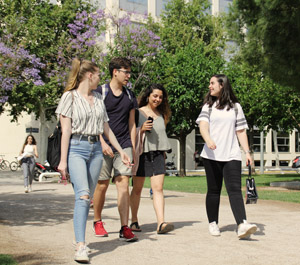2024 THE Impact Rankings
Times Higher Education recognizes UPV among the 200 universities with the most significant social and economic impact in the world
[ 12/06/2024 ]
The Universitat Politècnica de València (UPV) is one of the 200 universities with the most significant social and economic impact in the world and the best in Spain -along with 5 other academic institutions in the country-, the most outstanding of the national technological universities and the number one in the Valencian Community in this field. This is attested to by 2024 THE University Impact Rankings, the sixth edition of the ranking prepared by Times Higher Education (THE).
The ranking classifies higher education institutions based on their commitment to the Sustainable Development Goals (SDGs), an initiative the United Nations (UN) promoted in 2015.
Specifically, THE calculates each institution's overall position by combining its score on SDG 17 ("Partnerships for Achieving the Goals") with its three highest scores on the other SDGs. The final score is an average of the total scores over the last two years for the overall ranking.
Top 100 globally in three SDGs and number 1 nationally in 'Industry, innovation and infrastructure' and 'Climate action'.
2024 THE University Impact Rankings recognises the institution led by José E. Capilla as one of the top 100 worldwide in three SDGs: SDG 8 (Decent Work and Economic Growth), in which it is ranked 31st in the world; SDG 13 (Climate Action), ranked 33rd; and SDG 9 (Industry, Innovation and Infrastructure), ranked 91st.
According to THE Impact Rankings, UPV is also the best university in Spain in two indicators: Industry, Innovation and Infrastructure and Climate Action.
Likewise, the indicator, which analysed a total of 1,963 universities in this edition (372 more than last year), also includes the UPV among the top 200 universities in the world for SDG 4 (Quality Education) and among the 300 best universities in the world for SDG 6 (Clean Water and Sanitation) and 17 (Partnerships to achieve the Goals).
It should be recalled that the 17 SDGs were officially formulated on 25 September 2015, the day the UN adopted the 2030 Agenda for Sustainable Development, including 17 global goals to eradicate poverty, protect the planet and ensure prosperity. Each of them has specific targets to be achieved over the next 15 years.
UPV, internationally recognised by all the top rankings.
The ranking compiled by THE once again confirms the excellence of the UPV, recognised by all the major international rankings.
Not in vain, the Academic Ranking of World Universities (ARWU, popularly known as the Shanghai Ranking), in its latest edition, rated the UPV as the best technological university in Spain and, for the 19th consecutive year, among the 500 best universities in the world.
Besides, the latest edition of the QS World University Rankings, published earlier this month, included the UPV in the top 500 universities worldwide for the 13th consecutive year, as well as the best university in the Valencian Community.
Outstanding news
 Study a degree at the best technological university in Spain
Study a degree at the best technological university in Spain
The Universitat Politècnica de València is ranked number 1 among Spanish technology universities, according to the Shanghai ranking
 Highly Cited Researchers 2025
Highly Cited Researchers 2025
Avelí Corma, Juan Bisquert and Luis Guanter, the international scientific elite with a Universitat Politècnica de València hallmark
 Historic Milestone in Spanish Higher Education
Historic Milestone in Spanish Higher Education
The UPV inaugurates the Beihang Valencia Polytechnic Institute, the first Spanish university center in China
 Study in English
Study in English
The UPV offers eight degrees, 16 master's and 650 courses in English for the 2025-26 academic year
 A Latin Grammy... with the UPV hallmark
A Latin Grammy... with the UPV hallmark
'Music teaches us to listen and live together,' says Rafael Serrallet, Doctor of Music at the UPV, awarded in Las Vegas as the author of the Best Instrumental Album of 2025
 THE Impact Ranking
THE Impact Ranking
The UPV, the Spanish university with the greatest social and economic impact in the world

